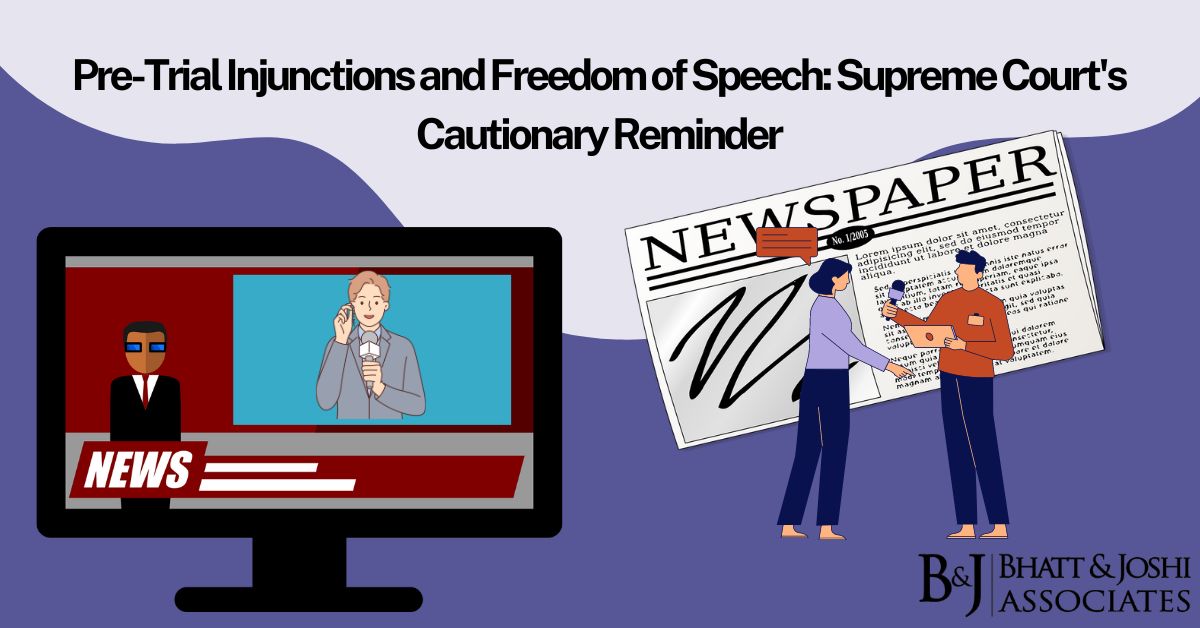Introduction: Pre-Trial Injunctions and Freedom of Speech
The issue of pre-trial injunctions against media platforms in defamation suits is a complex and contentious one, touching upon fundamental principles of freedom of speech and the press. In recent years, there has been growing concern about the potential chilling effect of such injunctions on journalistic expression and public discourse. The Supreme Court’s recent observations regarding the granting of interim relief in defamation cases provide an opportunity to delve deeper into this issue, examining the legal, ethical, and practical implications of such injunctions.
Understanding the Legal Framework in Pre-Trial Injunctions
Before delving into the specifics of the Supreme Court’s observations, it is essential to understand the legal framework surrounding pre-trial injunctions in defamation suits. In India, defamation is both a civil wrong and a criminal offense, with individuals and entities often seeking legal remedies to protect their reputation and privacy. Pre-trial injunctions, which restrain the publication of allegedly defamatory material pending the outcome of a trial, are a common legal tool used in such cases.
The Significance of Freedom of Speech in Pre-Trial Injunctions Debates
At the heart of the debate surrounding pre-trial injunctions lies the principle of freedom of speech, enshrined in Article 19(1)(a) of the Indian Constitution. Freedom of speech is not only a constitutional right but also a cornerstone of democratic society, enabling individuals to express their opinions, disseminate information, and hold those in power accountable. Any restriction on freedom of speech, including through the issuance of pre-trial injunctions, must be carefully scrutinized to ensure that it is justified and proportionate.
The Role of the Judiciary
In adjudicating defamation cases and considering requests for pre-trial injunctions, the judiciary plays a crucial role in balancing competing interests, including the right to reputation and privacy on one hand and freedom of speech on the other. The Supreme Court, as the highest judicial authority in the country, sets important precedents and guidelines that shape the legal landscape surrounding defamation and media freedom. Its recent observations regarding pre-trial injunctions reflect its ongoing engagement with these complex issues.
The Supreme Court’s Cautionary Reminder
In its recent observations, the Supreme Court urged trial courts to exercise caution when granting pre-trial injunctions against media publications in defamation suits. The Court emphasized that such injunctions not only impact the author’s right to publish but also the public’s right to know. This recognition of the broader implications of pre-trial injunctions is significant and underscores the need for a nuanced approach to balancing competing rights and interests.
The Three-Fold Test for Granting Interim Relief
The Court reiterated the three-fold test for granting interim relief in defamation cases: the existence of a prima facie case, a balance of convenience, and the presence of irreparable harm. However, it cautioned against applying these criteria mechanically, particularly in cases involving injunctions against journalistic pieces. The Court highlighted the importance of considering the fundamental right to free speech and the constitutional mandate of protecting journalistic expression in such cases.
Balancing Freedom of Speech with the Right to Reputation and Privacy
One of the key considerations emphasized by the Supreme Court is the need to balance the right to free speech with the right to reputation and privacy. While acknowledging the importance of protecting individuals and entities from defamation, the Court underscored the vital role of the media in facilitating public debate and informing citizens. Any restriction on freedom of speech must be carefully scrutinized to ensure that it is necessary and proportionate.
The Impact of Injunctions on Freedom of Speech
The Court warned against granting injunctions without sufficient evidence that the content in question is malicious or palpably false. It noted that such injunctions, particularly when granted ex-parte, may stifle public debate and impede the right to freedom of speech. The Court emphasized that injunctions should only be granted in exceptional cases where the respondent’s defense is unlikely to succeed at trial. Otherwise, they should be granted only after a full-fledged trial or, in exceptional cases, after the respondent has had the opportunity to present their case.
Understanding SLAPP Suits
The Court also addressed the phenomenon of SLAPP suits, which stands for “Strategic Litigation against Public Participation.” These suits are often initiated by entities with significant economic power to silence media or civil society voices and prevent the public from knowing about matters of public interest. The Court cautioned against the potential abuse of prolonged litigation to suppress free speech and public participation and called for greater awareness of the impact of SLAPP suits on democratic discourse.
Judicial Oversight and Intervention in Cases of Pre-Trial Injunctions
In cases where interim injunctions are granted arbitrarily or ignore established legal principles, the Court emphasized the importance of judicial oversight and intervention. Appellate courts have a duty to scrutinize such injunctions and intervene if the discretion has been exercised arbitrarily or in violation of settled legal principles. This underscores the judiciary’s role as a guardian of fundamental rights and the rule of law.
Conclusion: Safeguarding Freedom of Speech in Defamation Cases
In conclusion, the Supreme Court’s recent observations regarding pre-trial injunctions in defamation cases provide important guidance on safeguarding freedom of speech while balancing competing rights and interests. The Court’s emphasis on the need for caution, judicial oversight, and a nuanced approach to balancing the right to reputation and privacy with the right to free speech is timely and significant. As the custodian of constitutional values and democratic principles, the judiciary has a crucial role to play in ensuring that freedom of speech is protected and upheld in defamation cases, thereby fostering a vibrant and robust public discourse in India.














